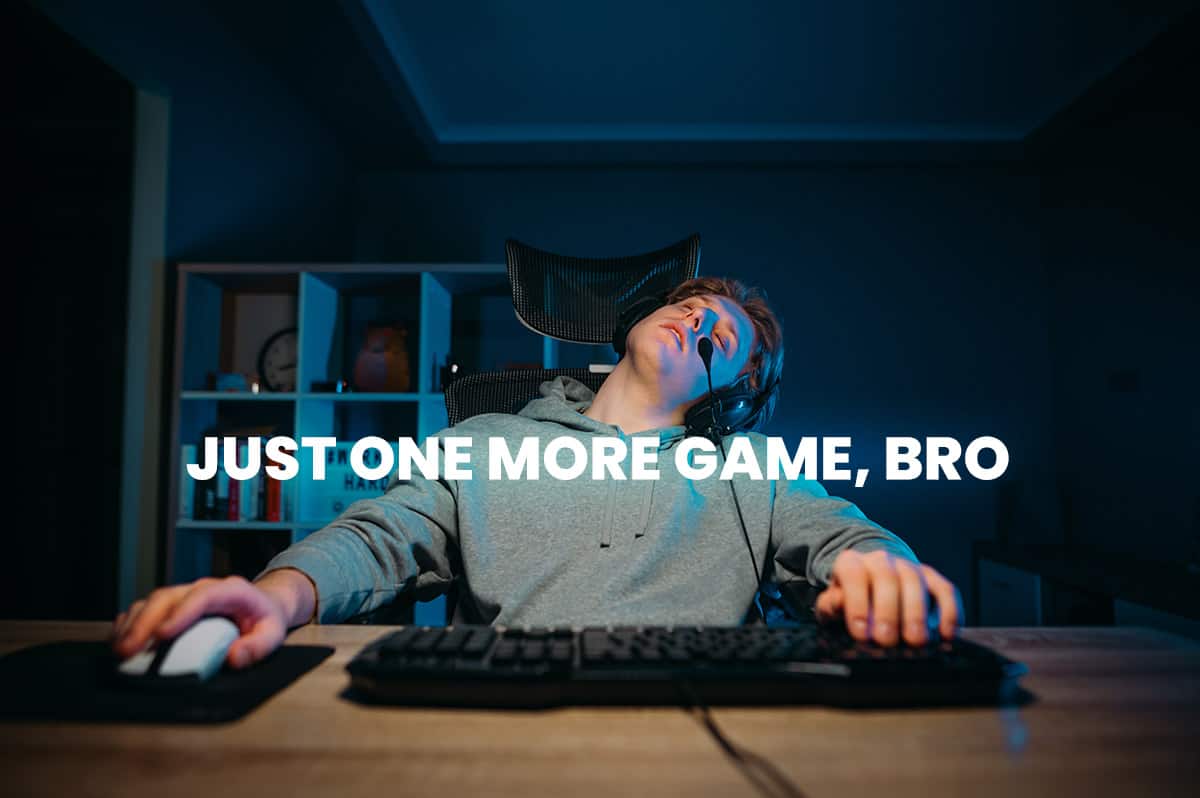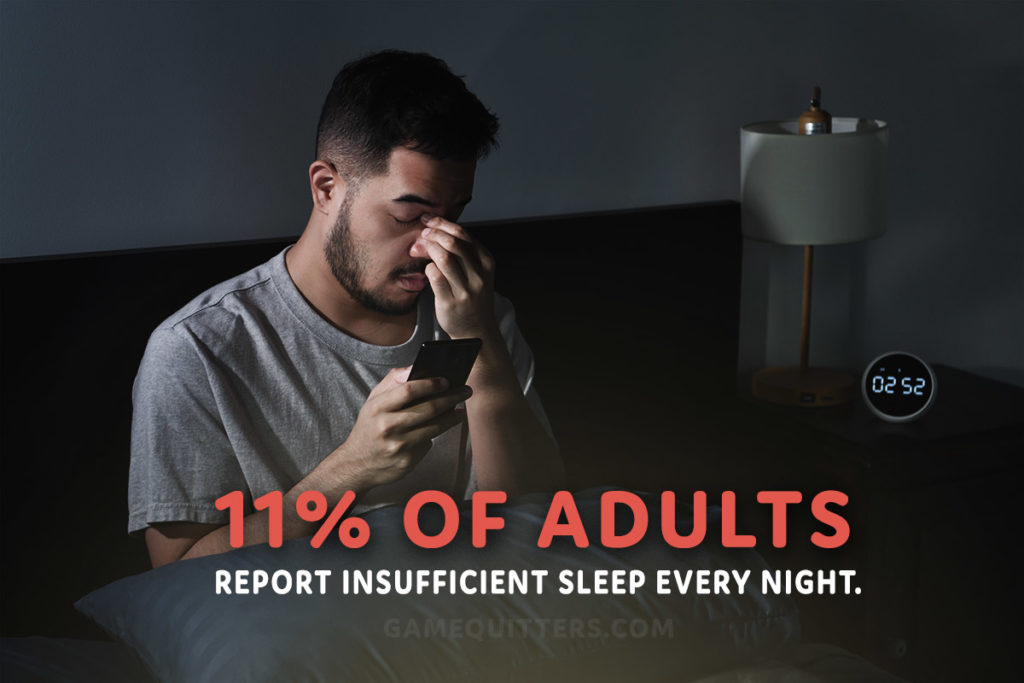
How to Fix Your Sleep Schedule as a Gamer
“Sometimes I got to bed at like 1am because I’m trying to complete a level. I just want to get to the end before I stop but it can go on and on… if I have to get up early then I can’t.”
Does this sound familiar? Are you or a loved one sleep deprived through gaming at night? If it has become a negative cycle and you don’t know where to turn, we can help.
Table of Contents
This article looks at why some gamers lose sleep to gaming, the symptoms of sleep deprivation and tips to fix your sleep schedule if night-time gaming is adversely affecting your life.
It’s possible to fix your sleep schedule, even if it’s reached the depths of degen. Soon you will wake up well rested and motivated for the day.
Gaming out of control? Get immediate help for you or your loved one’s gaming problem. Book a free Gameplan call now to learn if our program is the right fit for you.
Why do some gamers suffer with sleep deprivation?
Some gamers play video games late into the night and may get less sleep than they need. They may delay their bedtime to keep playing, wake in the middle of the night while their parents are asleep (in the case of young gamers) or rise early before school or work to play.
Gamers with friends in different time zones may justify playing at irregular hours to socialize with them or be on an esports team and have to practice at certain times. They may also feel compeled to play “just one more game” to complete a level of achievement or end on a win. Before they know, hours have passed and it’s the middle of the night – people with ADHD and executive function issues, in particular, may not track time well.
The mental stimulation of video games and the blue light of screens can interfere with sleep patterns and melatonin (the sleep hormone) production, so gamers don’t feel sleepy at bedtime. However, the later they play, the later they wake which can impact on school or work. It can lead to sleep deprivation and a degen sleep schedule which can have a major impact on all aspects of their health and wellness.
But what is a dengen sleep schedule? A degen (or degenerative) sleep schedule involves having an irregular sleep pattern where someone is often awake from midnight to 6am. The US Centers for Disease Control and Prevention has issued guidelines on the recommended number of hours of sleep per night needed by each age group.
Symptoms of sleep deprivation

Unhealthy sleep habits can have a profound effect on overall health and well-being on a day-to-day and potentially long-term basis. They can lead to the following physical and mental health problems:
- Obesity
- Type 2 diabetes
- Fatigue
- High blood pressure
- Heart disease
- Stroke
- Lack of concentration
- Irritability and anger
- Poor school or work performance
- Lower life expectancy
- Burnout
- Stress
- Anxiety
- Depression.
Sleep deprivation is not the only negative consequence of excessive gaming. If you are concerned about your gaming – or a loved one’s gaming habits – take our short online quiz to find out if you (or they) meet the criteria for gaming addiction.
8 ways to fix your sleep schedule

Here are some tips for resetting your sleep schedule if it has become unbalanced due to excessive gaming at night.
1. Set a sleep schedule
Choose a set bedtime and wake-up time and stick to them every day. By following a regular schedule, your body clock will develop a new routine and healthier sleeping habits. Over time, you will know the best time to sleep; you will be ready to go to bed, have an uninterrupted night’s sleep and wake up refreshed.
2. Remove all devices from bedrooms
Removing all screens (TV, tablets, smartphones, computers) from bedrooms will greatly improve sleep as they can stimulate the brain for several hours. The whole family can try this as an experiment for a week. Keeping devices that connect to the internet out of bedrooms also increases children’s online safety and parental control of content.
3. Create a relaxing sleeping environment
Make your bedroom conducive to a good night’s sleep. Turn off devices a minimum of one hour before bed and keep them outside the bedroom. If you live in a noisy area, white noise can help you drift off to sleep (fan, air conditioning, white noise machine) or get some earplugs. Ensure the room temperature is just right – not too hot and not too cold – and you have a comfortable mattress to sleep on.
4. Skip daytime naps
If you or a loved one are staying up late to game, it can be tempting to nap during the day. If you are trying to build healthy sleeping habits, this is the wrong approach. Daytime napping can cause grogginess and make it more difficult to sleep at night. If you get the right number of hours sleep per night, there should be no need to nap in the day.
5. Get daily exercise
Regular daily exercise is a good way to improve your sleep quality, and general health and well-being. According to the Sleep Foundation, moderate to vigorous exercise can reduce the amount of time it takes to fall asleep, lessen broken sleep at night and help alleviate daytime tiredness. However, exercising in the evening can overstimulate the body so avoid working out one to two hours before bedtime.
6. Eat early
As well as setting regular bedtime and wake-up times, having meals around the same time each day will also get your body into a regular routine. Try to eat your evening meal at least two to three hours before bed and watch what you eat– food with a high fat content might disrupt your sleep because it can take longer to digest.
7. Avoid late-night caffeine and alcohol consumption
Avoid drinking caffeinated drinks or alcohol when gaming in the evening. As a stimulant, caffeine can take up to 12 hours to wear off so try to restrict caffeine consumption to the morning. Drinking alcohol before bed can also cause disrupted sleep and make you feel tired the next day (regardless of how many hours sleep you’ve had) because it prevents you from reaching the rapid eye movement (REM) restorative stage of sleep.
8. Establish a calming bedtime routine
Creating a relaxing bedtime routine can help you wind down after an evening of gaming:
- Follow the same hygiene habits – take a bath or shower, brush your teeth
- Focus on calming activities such as deep breathing, yoga or meditation
- Write down your thoughts in a journal
- Read a book
- Listen to relaxing music.
Still need help?

If you or a loved one have tried these healthy sleeping tips without success, book a Gameplan call to discuss your situation. Limited spots are available.
Other specialist support and resources from Game Quitters include:
- Respawn program – learn how to manage your gaming habits and get your life back on track
- Reclaim program for families of problem gamers
- Game Quitters community forum where you’ll find like-minded people
- Real stories of former gaming addicts
- Hobby tool to find replacement interests and activities
